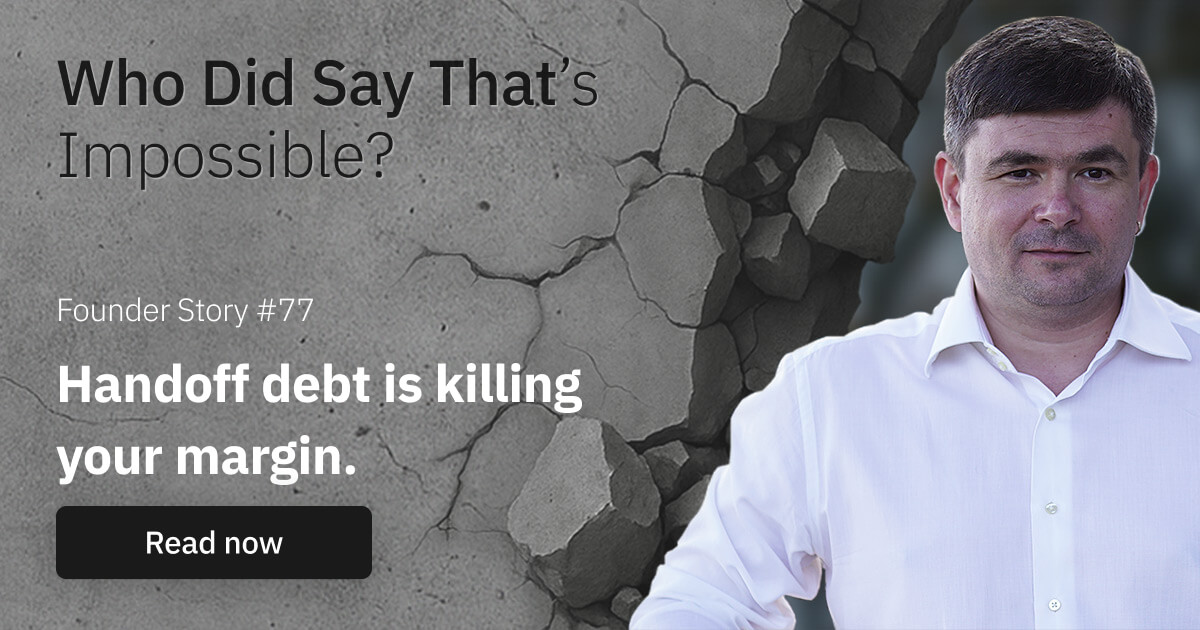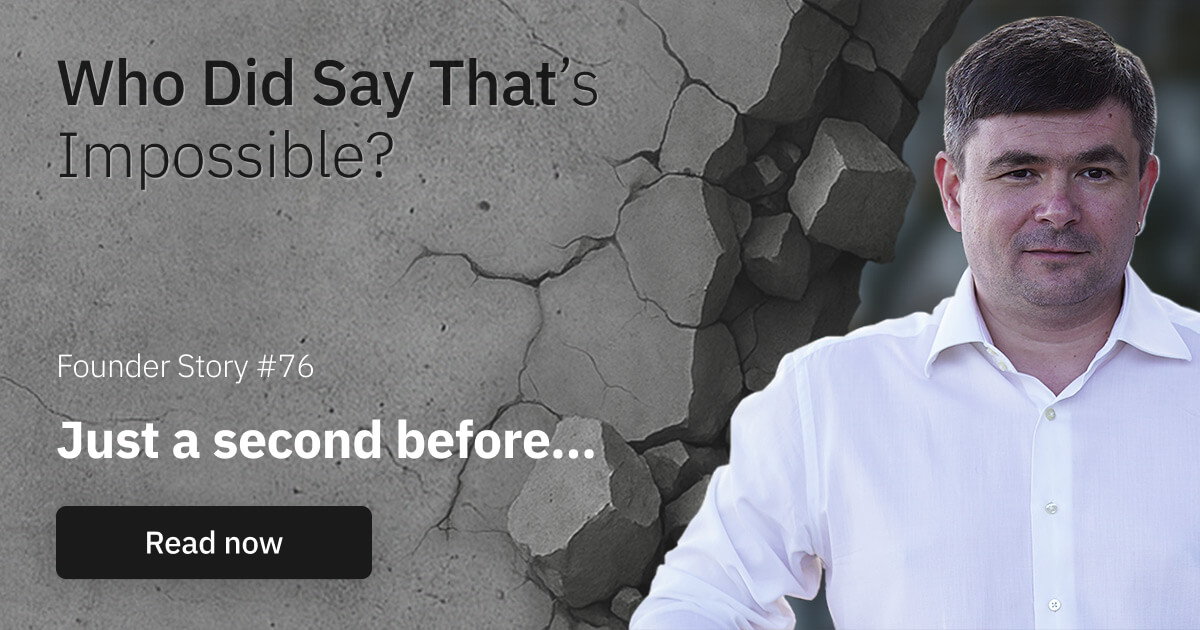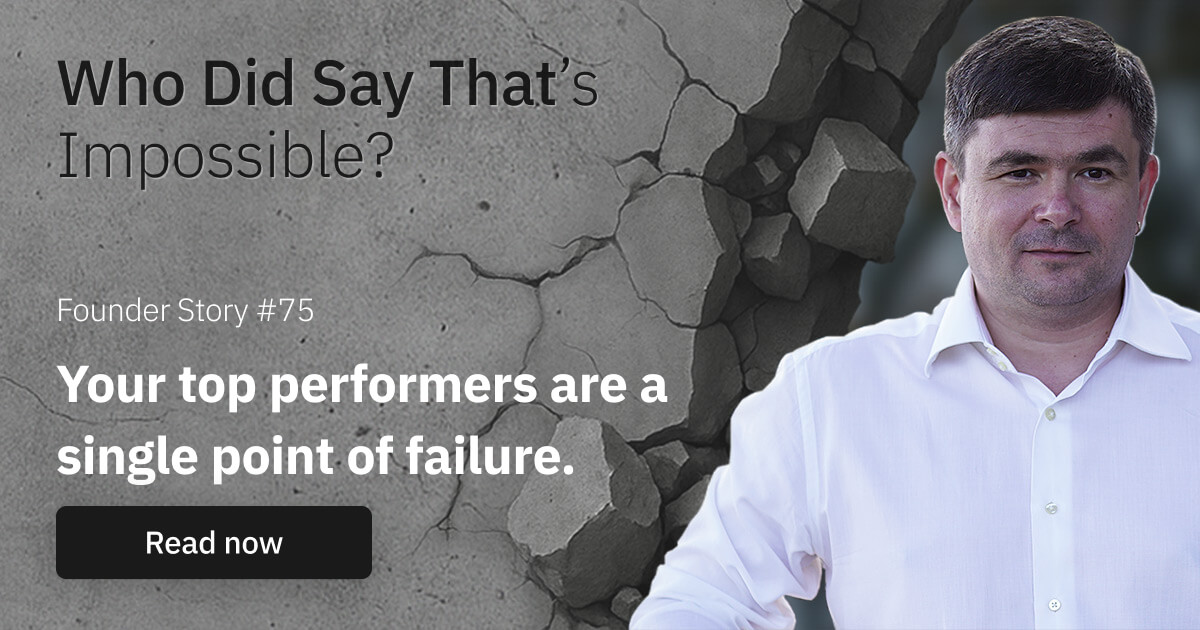How entrepreneurs can keep their sanity.
Or a minute of stress management
Business is tough.
Insanely tough.
It’s stress.
It’s responsibility.
It’s fear of failure.
It’s endless doubt.
It’s sleepless nights.
It’s constant anxiety.
If anyone says it’s simple, throw a slipper at them.
But business is also:
- freedom,
- new opportunities,
- doing what you love,
- no ceiling and no limits (except those in your head),
- and no need to slog yourself to a job you hate every morning.
The problem is, on the road to a dream, there’s a real chance of losing your mind.
The beauty—and the curse—of business is that you never know a damn thing: will it work or won’t it? Is this the right way to do it?
In a regular job? You show up, get an assignment, do it, go home.
If an entrepreneur starts doing routine tasks day in and day out, they’re no longer an entrepreneur. They’ve become an employee in their own business. Trust me, I’ve been there. Those routine tasks need to be delegated (if you’re smart about it).
An entrepreneur is a blend of leader, visionary, and manager who has to make decisions in total uncertainty—often at lightning speed.
Side note:
Don’t think that big corporations and wealthy business owners avoid these “pleasures.” They go through it all too. Just because someone has done it bigger and more often doesn’t mean they know what’s coming next. They have experience, knowledge, and willpower, yes, but that doesn’t mean they can see the future. They still fail and go bankrupt. But that’s another story.
Maybe only monopolies escape this, but at that point, they’re no longer real businesses anyway.And I’m mainly talking about small businesses, where these “thrills” come at you in full force.
In my previous email, I mentioned that nothing ever goes according to plan and discussed a few different ways to reach a goal:
- Just jump in and do it.
- Plan forever.
- Define a direction.
The third option is the most effective because there are so many unknowns that influence both decisions and the path.
Having a plan helps you stay on course when everything around you is falling apart. And yeah, sometimes that plan has to go straight into the trash, because things have changed so much that it’s useless.
Of course, this doesn’t add calm or health.
It adds one thing: stress.
That’s the stuff all the problems come from, as doctors say.
Nassim Taleb wrote about this in Antifragile, comparing stress in life and business. The main point of the book is about something else, but he nailed the effects of stress.
Small doses of stress are good for the body and for business. They:
- mobilizes you,
- activates survival defenses,
- forces you to drop the trivial and irrelevant,
- keep you focused on what’s most important.
But long-term, high-level stress becomes destructive. It weakens your will, health, and ability to keep moving forward.
Many people break at that point. And yes, some even lose their minds, turn to drinking, or fall into other destructive crap.
Taleb says it’s essential to build a business to be “antifragile”—stronger with every challenge and setback.
Preparing ahead by learning from others’ mistakes.
I’m not sure how realistic this is. My experience says winter always comes as a surprise, even when everyone knows the forecast. I’m not convinced complex systems can be made truly antifragile. And is it even necessary in business?
The most antifragile element should be the founder.
An entrepreneur-Phoenix who can rise from the ashes. Many successful entrepreneurs have lost businesses, gone bankrupt, endured personal crises, and come back stronger. Of course, there’s a “survivor’s bias”—we don’t hear about those who didn’t make it.
But still.
An entrepreneur MUST become antifragile.
Learn not to fear challenges and stress. Make them a source of energy and motivation: “Damn it, I’ll do this!”
If you fear this from the start and avoid hardships at all costs, sooner or later (more likely sooner), you’ll face all possible and impossible problems at once.
These situations usually don’t leave even a shred of a person intact.
Another critical moment - when stress hits the ceiling.
Everything’s collapsing, blows keep coming, one after the other.
You have to learn to let go.
Yes, it’s incredibly hard.
It pushes the limits—and maybe even beyond the limits—of human endurance. Especially when others are depending on you. But there are situations you simply cannot control. At all.
All that’s left is to accept it.
And to remember the words engraved on King Solomon’s ring: “This too shall pass.”
———
If you want to know more about other mess-ups and lessons on my entrepreneurial journey — subscribe to Eugene’s Stories.
See you soon!
- Eugene
- Eugene
Join the “most offbeat” Businessletter on entrepreneurship.

Hi, I’m Eugene.
Over the past 20+ years, I’ve grown an international agency from one-person freelance to a multimillion-dollar business. I’ve led teams, scaled systems, burned out, rebuilt, and learned (the hard way) what it really takes to run a business that doesn’t consume your life.
I help them make sense of complexity, design simple systems, and create the kind of business they actually want to run.
More Stories
Founder Stories

Handoff debt is killing your margin
Or minute of realizing your biggest costs live between tasks, not inside them.

Just a second before...
Or the minute you realize success and collapse are separated by one decision


